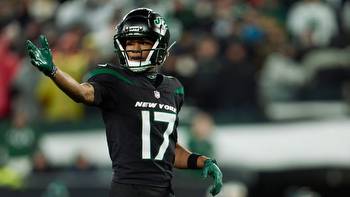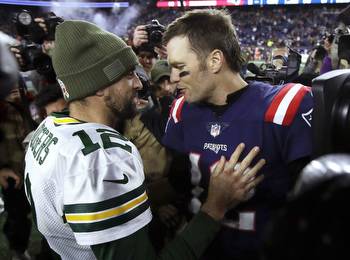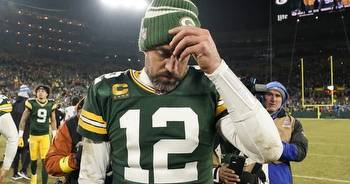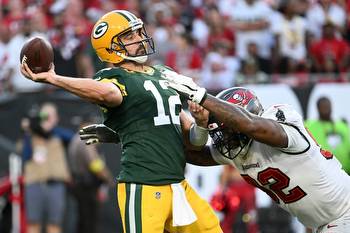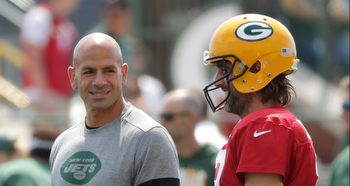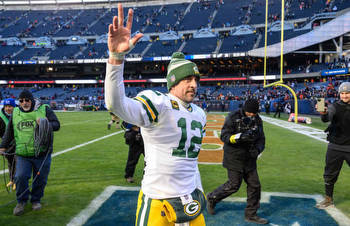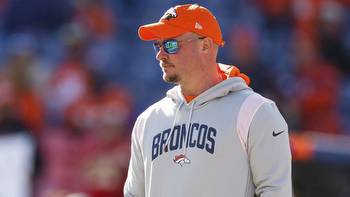Aaron Rodgers gets serious with the New York Jets
FLORHAM PARK, N.J.—It’s year 40 covering the NFL for me. Started with a team full of compelling figures in 1984, Cincinnati. Paul Brown, Sam Wyche, Cris Collinsworth, Anthony Munoz, Boomer Esiason as a rookie. That was not boring.
I figured the league’s most compelling figure in season 40 would be the best place to start, so here I am, myopically focused on new New York Jets quarterback Aaron Rodgers. Interesting scenes from the field. More interesting in a chair across from me post-practice. This was not boring.
Me: Leaving Green Bay—did you feel like you needed a change of scenery?
Rodgers: “Oh, I don’t know. I mean, I wanted to retire. That’s how I was leaning.”
Me: You said there was a 90-percent chance you’d retire, then you didn’t.
Rodgers: “Yeah, so then I think the answer’s probably yes [on the change of scenery], not no. The answer is yes I needed a change. I did think the change was gonna be retirement.”
Me: What happened?
Rodgers: “Basically I went into my darkness retreat. I came out after a lot of contemplation and realized … if Green Bay was open arms, come back, to lean into that and see if that’s what I really wanted. If they weren’t, then see what was out there. Just at least hear a pitch from another team, if that was the direction that Green Bay was leaning. And I came out and realized that was definitely the direction they were leaning. Look, it’s not their fault. I think it was time for everybody involved. When I met with the Jets at my house, I really felt like I had to at least strongly consider that opportunity. The more I thought about it and meditated on it and got back into my workouts and felt really good about where I was at and still wanting to play then I just thought that was the best option for me and the best opportunity.”
Me: Pure darkness? For three days?
Rodgers: “Four nights, five days. Yeah, definitely pure darkness.”
Me: Odd question, but how’d you get your food?
Rodgers: “There’s a little two-way box. It got put in one side, then he closed the door, then I took it out from the inside.”
Me: You know that the darkness retreat was an object of gigantic derision and people made fun of it. What really happens in there?
Rodgers: “Listen, a lot of the things that I’ve talked about that I’ve done, people don’t understand. I think there’s too many people who are judgmental without being curious. I think a lot of those people who had derogatory things to say about it actually are the ones who might benefit the most from some of the things that I’ve done. I think for me, I feel at my best when I’m open and being vulnerable about the things that I’m working on, things that I’m experiencing. It was a great time of contemplation for me to turn off. I don’t think in our, in most of our lives, we don’t get away from our phone for a few hours even on vacations. I needed a getaway to really contemplate my life as it was. Dream about my life post-football. Dream about my life still playing football. And then come to a better sense of what I wanted to do.”
Yes, it’s going to be an interesting season for the New York Football Jets, and for Rodgers, and the AFC East, and for the AFC as a whole. Rodgers’ football world: He plays Belichick twice, Tua Tagovailoa twice, Josh Allen twice. He plays stout Dallas and both Super Bowl teams from last year—before the bye. And if he survives that to make the postseason, he might have Mahomes and Burrow in his way … simply to make the Super Bowl. Insane. This is Rodgers’ 16 season as an NFL starter, and there’s no way he’s had a gauntlet like this one on the road to a title. Oh--and if we’re doing the over-under on Rodgers’ shelf life in New Jersey, give me 2.5 years. Or three. This is no dalliance.
—————
Good to be back after 11 weeks off. That was a great preview of my next life. I learned that I’m now a professional napper; my day’s not the best without one. More about my time away down in Ten Things.
It is very, very good to be back. I love my job, and I’m lucky I still get to do it.
My training camp trip started on a Jets-to-Steelers-to-Lions-to-Bills run. Boldface names you’ll read about: Mike Tomlin (in a new What I’ve Learned section of the column), Kenny Pickett, Amon-Ra St. Brown, Dan Campbell, Damar Hamlin, Josh Allen, Chris Spielman, Sean Payton, Joe Burrow, Dan Snyder, Bart Chezar. Bart Chezar? Yes. Bart’s an arborist. You’ll like his story this week.
On with the show. Rodgers. Let’s talk about money.
When I saw Tom Pelissero report that Rodgers gave up an estimated $35 million over the next two seasons, lowering his income to two years and $75 million, I thought there had to be something more to the story. Players move money around, or allow teams to change pay structure for cap purposes. But givebacks? Of that magnitude?
The reason is pretty simple. Rodgers just wanted to. He’d made $307 million in Green Bay and figured he didn’t have much time left, and if Jets GM Joe Douglas and coach Robert Saleh had an idea to tangibly improve the team in the next two to four years, well, he didn’t want his anchor of a contract to stand in the way.
“What it comes down to,” Rodgers said, searching for the words, “it was … it was the right thing that made me feel best.
“I thought it was important they knew how committed I was. And in my conversations with Joe, he has made it very clear the vision for the football team.
“You probably agree with this. This year, compared to like 2005, the amount of transactions that happen now with guys getting cut and the amount of trades—way more than before. Big names move at the trade deadline now. I wanted to make sure that if somebody valuable came available that we’d be able to get him. I’m very happy with the contract. I feel great about it.”
When I met with Rodgers, I’d say he was happy and content. Not giddy. But there was a clear feeling of rejuvenation about his life. He compared it to moving a lot when he was young. Six times, he said, by eighth grade, in Oregon and California. “When you’re the new kid in school, you gotta make new friends. You gotta figure out, you know, who the friend groups are and how to navigate a classroom and how to navigate the recess. But you also get to figure out who you wanna be. Do you wanna be the quiet kid? Do you wanna be the loud kid? Do you wanna be a leader? Do you wanna just go along with the flow? Where do the cool kids sit? The nerdy kids? It’s fun.
“Now I’ve gotten this opportunity at 39 to kind of reinvent myself, figure out who I wanna be in a new environment.”
Part of the environment, it seems, is a better relationship with the Jets’ GM than with Green Bay’s Brian Gutekunst. “To have some of the conversations I’ve had with Joe Douglas, to be privy to things that I was never privy to, to have a defensive head coach puts a different framework on the team,” Rodgers said. “The defense has a different confidence I think that they practice with. We had great defenses in Green Bay during our time. But it always felt like an offensive team. Or a West Coast offensive football team. Just a different mentality when you have a defensive head coach. I’ve enjoyed that. I enjoy coming to Robert with ideas or as maybe in a consultant role like, ‘Hey, I’ve been other places, I see this. I see that.’ And just him being kinda wide open, and maybe we disagree. I respect the hell out of him when he’s like, ‘Well I hear what you’re saying but I think I’m gonna do it this way.’ I love his openness to critically think about the stuff I’m saying or another group of guys might say to him.”
New Kid in Town for New York Jets: Allen LazardPeter King explains why Allen Lazard is his New Kid in Town for the New York Jets and why he believes the WR will be an impact player in his first season in New York.Rodgers, on the field, is an interesting case. When I watched him practice Thursday, I’d bet 18 to 20 times, minimum, he’d sidle up to a teammate—or Saleh, or defensive coordinator Jeff Ulbrich, or offensive boss Nathaniel Hackett—and give a coaching point or something. “I’ve never seen a player coach as much on the field as Aaron is doing right now,” Saleh said.
Part of the reason is pretty simple. The last iteration of the Green Bay offense, born in 2019 with the arrival of Matt LaFleur, was manufactured by LaFleur, Hackett and Rodgers. That’s the offense the Jets will use this year. Thus the Rodgers coaching points.
I’d give one cautionary tale about Rodgers and his new team. He turns 40 in December. He told me he’s sworn off all sweets. “Sadly,” he said. As Brady did late in his career, Rodgers has become a crusader about flexibility, about strengthening his legs, about diet. The temptation with a man who has the body of a 28-year-old in a league determined to keep the quarterbacks healthy is to think Rodgers can be Brady, an effective player well into his forties. Maybe Rodgers can, but it’s no lock.
“If I can string together a few seasons of good health, then I don’t want to put a cap on my future,” he said. “But I feel good about this not being just a one-year thing.”
A few seasons. Jets Nation exults. But at this point, particularly coming off a meh season (for Rodgers), absolutely nothing is guaranteed. That’s another reason why Aaron Rodgers is the most interesting man in the NFL in 2023.
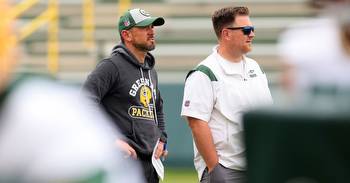







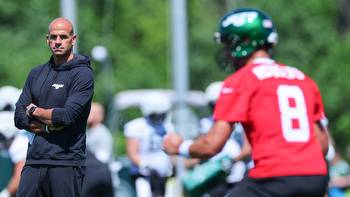


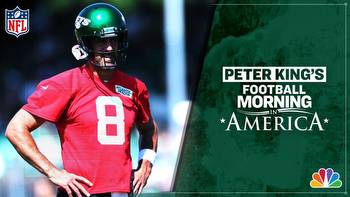
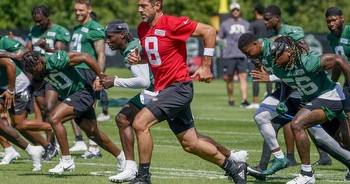
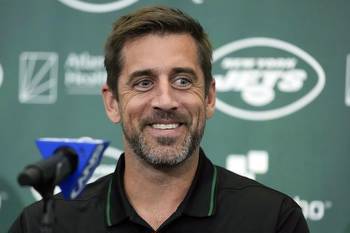
![NFL betting: How we are fading Aaron Rodgers and Russell Wilson [Video]](/img/di/nfl-betting-how-we-are-fading-aaron-rodgers-and-russell-wilson-video-1.jpg)
